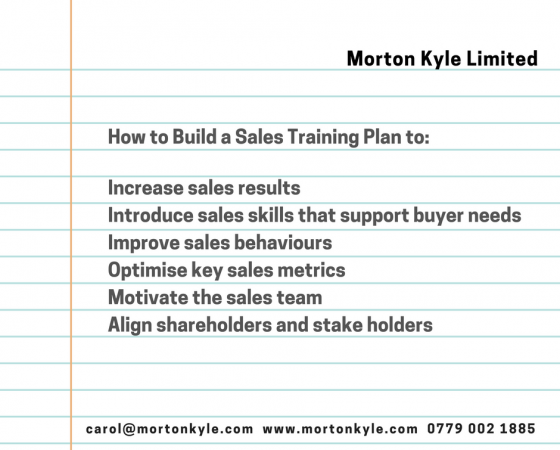A sales training plan makes things easier.
It optimises sales results long term.
And empowers all parties to take ownership of the intervention for for ongoing growth.
A simple sales training roadmap helps everyone navigate the sales training experience and ensure the right milestones are hit at the right time, in the right way, and with the right effects.
It makes sense that all sales training budgets come with a pre-built ROI plan.
So a sales training roadmap is needed for everyone. Including the training partner, the sales managers and coaches and the people being trained, the people spending their budget.
Just like setting out a journey for any endeavour, whether it’s a trip to the coast or a climb up Snowdon. Everyone needs to know the route, the stops, the expectations and the destination.
Any good sales training roadmap also covers after care. In this situation, what needs to happen post training to ensure the sales results do achieve their highest optimal scale over time.
Hit and Run Sales Training Doesn’t Work | Use a Sales Training Roadmap to Maximise Sales Impact Longer Term
Sheep deep training is a waste of your training budget AND is typically more of an interruption and annoyance than a solve for knotty sales problems. You might get a small spike in activity, a swift period of changed behaviours…but a long term meaningful improvement in sales? Rarely to never.
A sales training roadmap means you hit the points you want. You get the optimal build in results you’d expect from sales training delivered and implemented at the deepest level.
No surprises at all, and no waste-of-time detours doing stuff that doesn’t work.
It might seem like the boring bit but it’s the simplest way to make sure everyone gets on the bus! That your training budget is well spend, and your organisation gets a full knowledge transfer.
That’s why I always insist on agreeing the following 8 things in a Morton Kyle sales training plan. It’s important to me that we build a sales roadmap so we can help clients to hit their goals, at speed and with the minimum amount of effort and disruption…long after the training is completed.
If you have any you’d like to add, drop a note in the comments:
Sales Training Plan 1 : Where is the team starting from?
For this you’ll need a good Training Needs Analysis – we’ll listen into a good selection of calls, some accompanies sales visits, one on one interviews with the sales teams to see the difference between what they know and what they do.
(Did you know we do a free training needs analysis with all of our sales training courses?)
The skill in this section is understanding where the sales person is on their journey so the training can closely match the gap between where they are and where they need to be.
BUT even better – this section means we won’t waste your time or budget training your team in elements of selling that they are already great at!
Out of this we might ask questions like
- Does the sales person have a working sales process?
- Is it fully formed or still in the build phase?
- How are they developing it?
- Where do they need help?
- Do they understand why they win some sales and lose others?
- What level of self awareness do they have?
- Can they realistically self-reflect, critique and learn to amend?
- Levels of product knowledge, market awareness and competitor awareness
This is also an opportunity to let the team dictate the building blocks of the course, it’s delivery format and where they will get the most value from the sales training.
Did you know that with Morton Kyle Sales Training you get a free sales training needs analysis prior to every course? You can find out more here tell me more about the free sales training needs analysis
Sales Training Plan 2 : Where are the sales road blocks?
This means a deep dive into the sales CRM, sales forecasts versus order books and the sales pipeline.
- Deals are sticking…but where?
- Where is the sales CRM bulging?
- What’s the sales process and where are the sales metrics in that sales process?
- What are the sales metrics from the last 6 months?
- What information is coming back from lost sales analysis?
- Why do current customers buy?
Sales Training Plan 3 : Does everyone in the sales team need the same training?
- Can you see any trends?
- Maybe attached to regions, channels, time served, line manager?
This requires a review of the sales conversion rates, individual close rates, team close rates, channel and team close rates.
The same with average order values, discount levels, turnover, margins and number of customers, sales cycle duration and product sales levels.
You might also want yo include appointments set, leads generated, cancellation rate of booked appointments, percentage use of diary selling time.
Using this it’s easier to see who needs what in terms of sales training and from there draw up a list of the most needed sales training based on the biggest positive change in the shortest possible time.
It also gives a foundation to how to measure the improvements as a result of any sales training.
Plus, in this section, you’ll need to agree the format of the training, and the follow up.
- Do the team need small workshops, online training, classroom sales training, field based sales training, side by side call coaching….there are any number of combinations to get the new skills and behaviours into the team…
Sales Training Plan 4 : Who will own the training to ensure it’s embedded in the business post delivery?
Help others understand that good sales training is not a one hit event.
It needs to be referenced daily, on the basis ‘this is how we do thing around here’
The sales training outputs become your Sales Playbook
- Who is the internal owner and sales training champion?
- How will the sales training be embedded and defaulted to?
- In what way will it be supported and measured?
- How will its usage be audited?
Sales Training Plan 5 : What are the key numbers that need to change?
- And what are those numbers now?
Whether you’re talking about boosting the average order value, increasing margin by 10%, reducing discount by 90%, building market share by 15%, increasing sales conversion rate by 9%, reducing cancellation rates by 60%, shortening sales cycles by 70%…whatever the key numbers are, or combination of numbers are, you need fine detail.
- What are those ideal numbers now?
- How are they calculated?
- What do you want those numbers to be?
- By when?
Get agreement with all owners and parties on these hard measures.
In this section beware of numbers conflicting – for example shortening sales cycle could be a valid target, however if the average order value increases, this may naturally wipe out any incremental shortening of sales cycles so try to look at any matrix based outcomes in the round and manage expectations accordingly.
Sales Training Plan 6 : Don’t get hung up with selling the sales training agenda with the managers as much as…
Getting the attendees to sign of on the content.
You might want to do this as a focus group, or a one on one event or even as a survey monkey exercise, maybe even anonymous.
This helps buy in and build curiosity.
The recipients of your sales training course are the final customers. High buy in means sticky sales training that works, the business wins.
Low buy in, everyone’s miserable, and nothing changes.
Sales Training Plan 7 : What’s the launch look like?
This is not just a sales training plan to support the creation and delivery of first class sales training.
This is a culture changing event.
You are changing behaviours.
You’ll help processes become realigned with thinking.
You’ll build bridges, stake holders and shareholders needs will be drawn together.
So, get the champions involved in the build up.
Is the location fitting enough for the level of importance of the training?
- Who is attending and giving their support?
- Are they participating or simply working in the room?
The smallest things knock the message. Get the launch right.
You can build and engagement and excitement pre-event.
You should draw a line in the sand in terms of pre sales training and post sales training, the old versus the new.
Sales Training Plan 8 : Enjoy the day!
Of course, everyone is there to learn.
Everyone attendee wants to discover new ways of doing business and improving sales.
That’s why the sales person must get involved in real world sales problems, to become better become informed and because of the mental stretch
The learning becomes emotional!
Attendees having fun are more likely to take the skills and the knowledge back to the work place!
Conveying ownership and accountability is critical to the success of any sales training and your sales training plan will accommodate this, just don’t forget the fun!
If you’re looking to increase the sales results in your business, and think proactive, high impact B2B sales training is one way to do this, call us for a confidential chat. I’d be happy to share how we’ve helped others to make lasting change in their business and sales function.
Call / text Carol on 0779 002 1885 to start your conversation
You can also check out feedback from some of our past clients here – Client Feedback or just hit the Client View Tab at the top of this page.
Sales Training Roadmap | Summary
Having a sales training roadmap is a critical starting point for any sales growth.
To change the results you get everyday – skills, behaviours, attitudes, mindsets and activities need to change.
New habits take a minimum of 21 days to change, older habits take much longer to banish, so thinking that a one day sales training course will change much is a stretch at best.
Having a robust sales training plan, a detailed sales training roadmap and a will to do the work over the longer term will be good for business, good for your sales function, and good for your growth.
Looking for something else?
Alternatively, if you are looking for an open B2B sales training course or an in house generic sales improvement course check out The Sales Improvement Workshop
Your sales plan is the very start of your sales training journey, and your sales training will benefit hugely from having a granular level sales plan to drive the specific sales changes you want.
If you’re looking to boost your sales training results even more – check out what questions you need to ask your sales training provider before you spend your budget – useful reading and guaranteed to help you build a sales training plan that hits your targets
If you’d like to book some time in to discuss how your how you can boost your sales results then check out our special sales coaching offer – 5 x 1 hr sessions for just £250 plus VAT


With so much information available about how to improve sales, the best sales method, how modern byers want to buy then it’s tough to know where to start if your sales results aren’t where you need them to be. That’s why we bring CLARITY from CONFUSION! With our holistic approach to improving B2B sales performance, my clients can see an immediate uplift in sales outputs because we only focus on the elements of your sales function that are dragging your sales results down! There is nothing hit and miss with our sales improvement support.
What does that mean? Faster results, less time!
Don’t get bogged down in out the box sales solutions and ‘hit and run’ sales training – you’re closer than you think to getting the sales results you want.
Let’s chat!
What’s you sales challenge?


